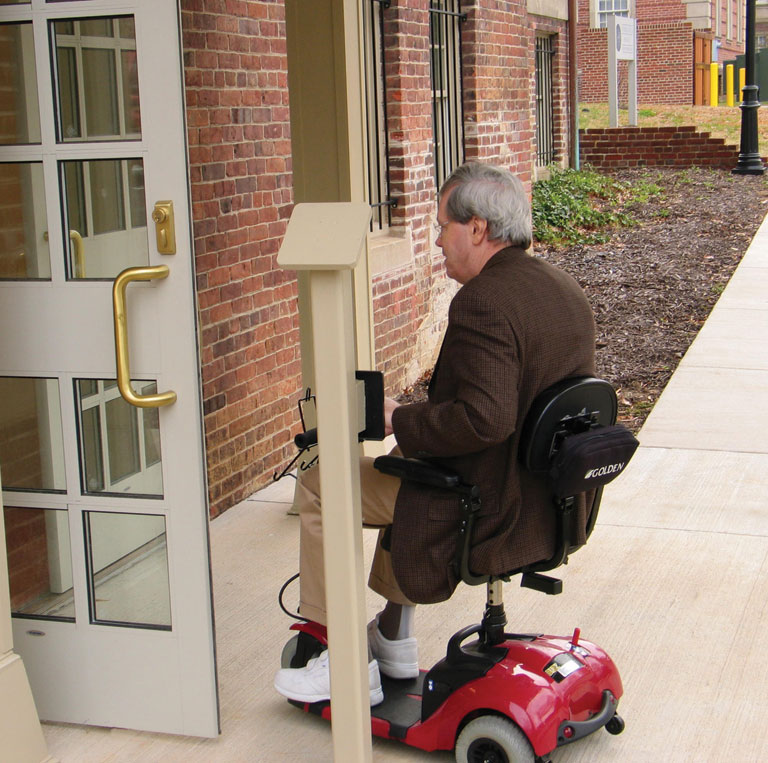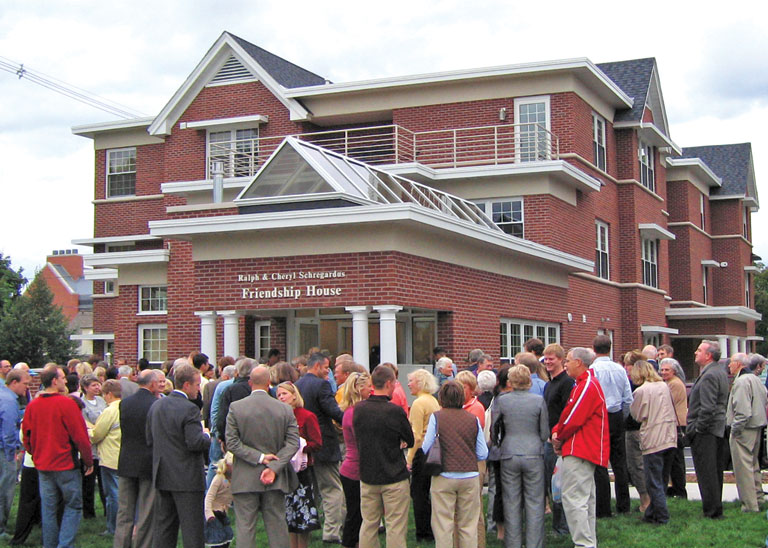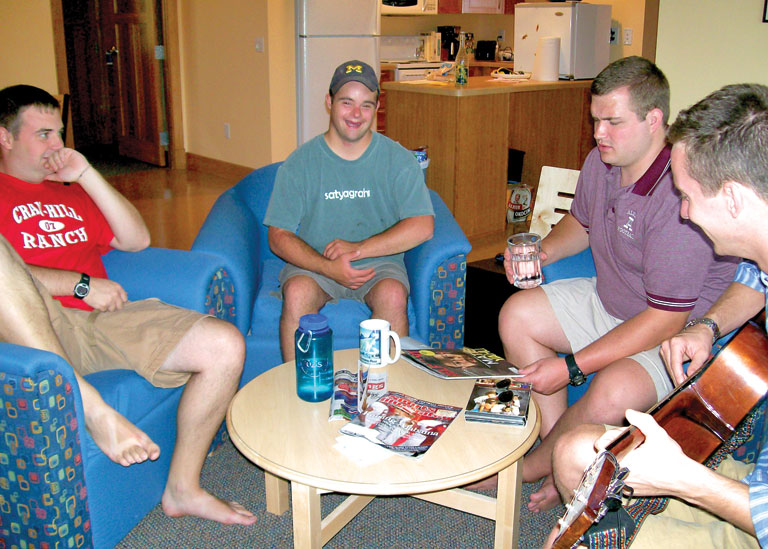 |
| The Rev. Thomas H. Graves helped to develop the Association of Theological Schools policy statement on disability. While president of the Baptist Theological Seminary at Richmond, Graves encouraged his board to ensure that newly renovated Virginia Hall was made completely accessible to people with disabilities. |
For the board of the Baptist Theological Seminary at Richmond (BTSR), this wasn't a theoretical question. A few years ago, the Virginia theological school, which is affiliated with the Cooperative Baptist Fellowship, decided to commit itself to accessibility for disabled persons while making plans to renovate. Now complete, the building provides parking adjacent to electronically assisted front doors and an elevator. Its chapel, offices, classrooms, lounges, and restrooms are models of accessibility. And the former president, the Rev. Thomas H. Graves, who uses an electric scooter, praises the wisdom of the board for providing facilities that are free of barriers and welcome everyone.
Recognizing Graves' diminishing physical stamina, the board began planning for presidential succession as it started drawing up a strategic plan in 2005. By the summer of 2006, the president signaled a need to step down due to increasing disability. The board selected a new president in early 2007, allowing for a smooth transition and a few months of overlap before Graves retired and the new president, the Rev. Ronald Crawford, began officially in July 2007.
The BTSR board faced two issues of disability at once - a new building and a health-related leadership transition. Yet whether dealing with buildings or personnel, issues of disability are of increasing concern to many other governing boards as well. Recognizing its importance, members of the Association of Theological Schools voted this June to adopt a new policy statement encouraging seminaries to become more hospitable and welcoming to persons with disabilities and to live toward "a vision of inclusion of all God's people in theological education."
A new policy statement
Policy statements are distinct from accrediting standards, says ATS executive director Daniel Aleshire, in that they offer advice and counsel to member schools on particular issues. "This policy statement has an aspirational quality to it," Aleshire says. "It encourages schools and their boards to consider what, within their circumstances, they can do to foster the full participation of persons with disabilities in the life of the school and also to prepare students for ministry to and with people who live with disabilities in the churches they will serve." The policy itself states that "it is intended to outline the goals by which theological schools can make theological education possible for persons with disabilities who possess the gifts and abilities for ministry."
Over several years, ATS staff members had become increasingly aware that theological schools were addressing disability in creative ways. In 2006, ATS convened a consultation to discuss how the association might be helpful in this area. Noting the absence of disability as a diversity category in the accrediting standards, the consultation proposed developing a policy statement to give guidance and counsel to member schools on this topic. A small task force, appointed by the ATS board of directors, drafted the policy statement over the next year. It was subsequently endorsed by the board and then adopted by the member schools in 2008.
The statement is not legal advice. Because ATS schools are located in both the United States and Canada, and because federal, state, and provincial laws and regulations vary with respect to disability, the policy statement advises schools to "seek their own legal counsel and to be informed of their legal obligations."
The board's focus
Some of the areas that the policy statement addresses are closely related to the work of the board-mission, recruitment, assessment, barriers, and budget. The last two are likely to capture the immediate attention of board members who blanch at the cost of retrofitting old buildings for barrierfree access. "Financial cost is always a concern for schools whose budgets are stretched thin," says Aleshire, "but I would encourage trustees to think about this policy not in terms of potential cost, but in terms of opportunity." While the policy statement acknowledges that some ATS member schools have more resources than others, it also cautions against using financial pressures as an excuse for avoiding the commitments necessary to educate and employ people who have disabilities.
One opportunity for board action is conducting a disability audit of the campus, including both trustees and people with disabilities on the audit task group. The audit can help the board establish both short- and longer-term goals by assessing the school's physical environment, identifying where improved access is needed, determining creative approaches for immediate positive impact, and establishing priorities for the future.
The results of the audit can become a part of the program and financial plan of the institution. But schools should also be aware of community resources that can help address needs identified in the audit - resources like agencies that focus on disability concerns, potential partner organizations, and individuals with particular expertise. Freestanding schools that do not have access to a university office of disability affairs might consider contracting with the appropriate office of a nearby community college.
Mission
The policy begins by inviting attention to the mission of the school. Is the mission statement inclusive of all the school's constituents - students, staff, faculty, administrators, board members, denominational representatives, donors, family members, and visitors to the campus? Does it recognize their contributions and their needs?including those who live with disability? Does it ensure that people with disabilities are not excluded from the life and work of the school on the basis of their disabilities? Does the mission statement overtly welcome the participation of people who live with disability?
As a board periodically reviews the school's mission statement, it is helpful to examine whether the school's work is as inclusive as the mission statement suggests. Bruce Birch, academic dean at Wesley Theological Seminary in Washington, D.C., and a member of the task force that drafted the policy, says that many schools' mission statements already include language that suggests inclusiveness. "The language of so many theological school mission statements includes wording such as 'ministry to all God's people.' I wonder if we don't have a truncated idea of what 'all God's people' actually means." Just as the church welcomes all people, the theological school should seek to ensure that qualified persons who have disabilities are not excluded from education for the ministries of the church or employment within the theological school.
What else?
Boards can avoid getting bogged down in administrative details by focusing on the big picture. Four areas for which boards have particular responsibility:
■ Recruitment of students, staff, and especially faculty.
■ Assessment of the school's overall performance.
■ Overcoming barriers - and not just physical barriers like curbs - that impede full participation.
■ Ensuring that the budget reflects a school's stated priorities.
Recruitment
The board needs to be certain that qualified students, staff, faculty, administrators, and board members who have disabilities are recruited with the same intentionality as other underrepresented groups in theological education. While student recruitment is not within the purview of the board, board members should encourage that students with disabilities be recruited with the same enthusiasm and care as other students. Thus the policy statement declares that "[s]tudents with disabilities should apply for admission under the same guidelines and careful screening as other students to determine whether they have the gifts and readiness for life and learning in a theological community and for future religious leadership."
Thomas Graves, the retired Baptist seminary president, was chair of the task force that drafted the policy statement. He points out that students and faculty members with disabilities are a powerful source of theological insight and understanding through their interactions with others on the campus. "Boards need to think beyond the important issue of student recruitment," he says, adding that faculty appointments, staff positions, and openings on the board itself should involve a conscious effort to enlist persons with disabilities.
Assessment
Graves also cautions that if the board oversees assessment, it needs to examine disability issues as well. "We know how pervasive assessment has become as an expectation in higher education," he says. "I believe it is the responsibility of the board to ensure that the school has processes and procedures in place for including the contributions and responding to the needs of persons with disabilities." Other questions the board might ask:
-
Does the curriculum include issues related to disability?
-
How are ministerial students formed for effective ministry to and with the disabled persons they will encounter in their congregations?
-
How successful has the school been in recruiting persons with disabilities?
-
If we have more people with disability in our classes and on campus, can we measure the impact on our graduates' work?
Barriers to participation
The most obvious obstacles to full participation that people with physical disabilities face are literal barriers like stairs and curbs. Naturally, following best practices in this area means installing curb cuts, reserving parking spaces, adding handrails and ramps, removing fixed seats in the chapel to open up wheelchair spaces, modifying restrooms, and providing assistive technologies. A disability audit may raise other, less obvious obstacles that require attention. Changing the location where a class meets, being careful to schedule events in accessible venues, and creating worship spaces that are inviting to everyone may carry no financial cost at all and may nevertheless demonstrate a school's good intentions. Above all, clear guidelines and procedures should be established so that staff and faculty know how to respond to requests for special services.
An unhelpful attitude can be as imposing as a staircase. But schools can address attitudes through programs that raise awareness and understanding within the seminary community. Awareness opportunities should have both theological and practical components. And professors can be offered help in creating classroom settings and teaching methods that are sensitive to students with disabilities.
Budget
As a school's board attends to the budget and financial resources, it needs to decide what is financially possible to move the school toward greater inclusiveness of persons with disabilities. The policy statement recognizes the varying financial circumstances among ATS schools and yet calls schools to embrace a vision of what a hospitable and welcoming campus could be.
Bruce Birth of Wesley Theological Seminary expresses this aptly: "One way this policy statement challenges us all is to expand the vision of the churches we serve and to think more deeply about who is included and who is excluded in our ministries." In this perspective, creating a campus that is hospitable to people with disabilities is real preparation for ministry.
 |
| The "Ralph and Cheryl Schregardus Friendship House" opened to fanfare in 2007. Its "friend residents," who are young adults with cognitive impairments, can stay up to 10 years before finding other housing in the community. |
|
Through families in his church who have adult children with special needs, Floding became aware of the challenge they face to find safe, affordable, independent living arrangements for their children. "I knew the seminary was in need of additional student housing," Floding said, "So, with considerable thought and conversation, we put their need together with our need and developed the idea of Friendship House."
A core planning group, including four families with young adult children with special needs, ultimately made the case for the Friendship House concept to the Western Seminary trustees, who embraced it as consistent with the mission of the school to prepare leaders to serve the church. Retrofitting an existing building in the community proved too expensive, leading to the decision for new construction.
"The purpose of Friendship House is far greater than just providing housing," says Floding. "We know that every church, every community, every seminary has people in it who live with some form of disability, perhaps as high as 18 percent of our population in the United States. And we are aware of the hurdles that people with a variety of disabilities face when seeking to become part of a faith community. We are becoming much more intentional at Western Seminary in preparing leaders for the church who are better equipped to address this challenge helpfully. We are simply not equipping our students to lead in ministry if we don't do anything in this area."
"The stories families tell of how their churches and pastors did not know how to relate to their disabled children are just heartbreaking," says Terika Raak, a senior seminary student and second-year resident of Friendship House. "So, it is valuable to break this cycle and gain understanding by becoming more familiar with people with disabilities. I love living in Friendship House. After a long, intense day of classes and studying, it is very refreshing to come home and be greeted by housemates with huge smiles and a completely different outlook on life. They do not get caught up in or bothered by the little things. They are much more carefree and enjoying the privilege of being able to live on their own." (Each of the six apartments in Friendship House has room for one "friend resident" with a cognitive impairment and three Western Theological Seminary students.)
Seminary student Chris Maybury signed up to live at Friendship House when he learned that a friend who has disabilities had decided to live there. "We had worked together at a Young Life camp two summers ago," Maybury explains, "and we thought it would be fun to live together. Before Friendship House, I saw him as an awesome guy with disabilities, but now I just see him as an awesome guy."
 |
|
Each of the six apartments in Friendship House has room for one "friend resident" with a cognitive impairment and three Western Theological Seminary students.
|
In its second year, the residence has a waiting list for "friend residents" from the community at large. "The friend residents are actually the more permanent residents," Floding explains, "and the students are the temporary residents." Residents from the community can live in Friendship House up to ten years, by which time they must develop a plan for their own permanent housing.
"Friendship House has allowed me to see how much people with disabilities truly do want to live independently, but we have not given them the resources," says Jill Vande Zande, a seminarian and Friendship House resident who has cerebral palsy. "Living here gives us a window into a world that we would otherwise not see, and what we see are humans who are in full possession of their personhood. They are able to accomplish much more than we give them credit for - they only need a little help. They can teach us much about perseverance, grace, and appreciation for life."
Matthew Floding would like to see the Friendship House model replicated in other places - even in small ways. "A number of schools are bringing older housing up to ADA standards. Why not plan to provide a limited number of spaces for persons with disabilities for inclusion in the life of that community?" he asks. "Other schools are building brand new facilities. Why not build this concept, in a limited way, into the plans? Others could provide a space or two on a Friendship Floor in older dormitory-style housing."
Chapel services are held daily at Western Theological Seminary, and faculty members lead the service on Fridays. When it was Floding's turn to lead chapel, he invited "friend residents" to help him in the service. They assisted with serving communion, making vivid to all the open invitation to share in the sacrament. "Grace is not about cognitive or physical abilities," Floding says. "Grace overcomes all that. Everyone is welcome at the table."